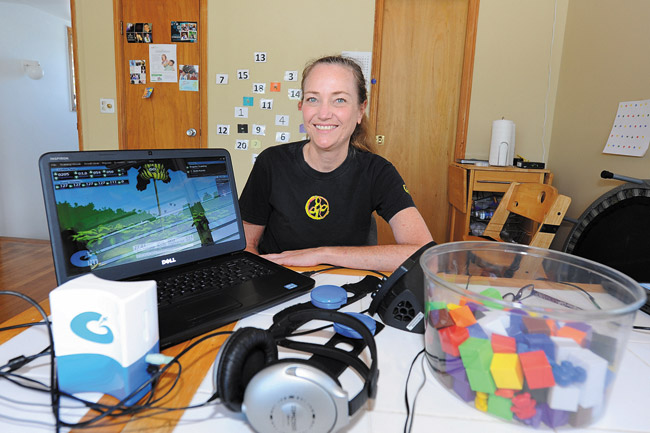Personal Need Fuels Treatment Program

Susan Sorensen with a variety of tools and games she utilizes to treat clients at her business Learn2Focus. Lawrence Tabudlo photo
Nearly 15 years ago, Susan Sorensen started trekking to the Mainland to seek out specialists to help her then-8-year-old daughter, who suffers from a severe form of apraxia, a motor-planning disorder that can affect speech and any kind of coordinated movement. Her hunt for effective treatment lasted several years, until one of the specialists introduced her to a method called Interactive Metronome, a therapeutic tool that is designed to address motor skills and cognitive issues.
“I saw improvement like I hadn’t ever seen before,” Sorensen recalls.
But when they returned home, they couldn’t find anybody in the Islands who was certified in the method. Wanting to continue her daughter’s treatment, Sorensen earned certification in Interactive Metronome, followed later by certifications in other treatment programs that address processing issues and literacy.
Soon a friend of Sorensen asked for help with her child, who faced similar challenges. In 2008, Sorensen launched Learn2Focus, a training and support program for individuals with a range of conditions, including developmental disabilities, auditory processing disorders, dyslexia, language and literacy issues, and focus and attention disorders including ADD and ADHD. The training at Learn2Focus, Sorensen says, can increase concentration, improve motor skills and boost reading comprehension. She also has treated adults who suffer from dementia or are dealing with effects of a stroke.
Throughout the years, Sorensen has served hundreds of clients. In addition to seeing patients of all ages in her home office, Sorensen also provides online training to families internationally. For each individual, Sorensen designs a program specifically tailored to their needs. She also continually is creating new games as a client progresses to keep them engaged.
The program also ended up helping her own son, who has Down syndrome. He always had been high functioning, until he was diagnosed with a rare autoimmune disease that caused him to lose all of his skills – he could no longer read, write, tie his shoes or even eat properly.
“I developed my own program for him using Interactive Metronome, listening programs, reading training and vision training,” she says. “And you know what? He can eat safely now, he can read, he can write, he can swim again.”
While Sorensen says that the training she provides is not a “magic bullet” for every individual, she certainly has seen some magical results in the last five years. Sorensen has worked with kids who had been failing their classes but report a dramatic increase in their grades after undergoing treatment.
In 2012, one family came to Sorensen with a problem: Their 4-year-old son had been kicked out of his preschool class because his behavior was so bad.
“Just get the picture of the Tasmanian Devil, and that is what this kid looked like, just whirling all over the place. He would throw himself into the floor and smash himself into the wall,” Sorensen says, adding that he also had trouble interacting with his peers.
When he first came to Learn2Focus, he could barely sit still long enough to start an Interactive Metronome game. But after going through sessions three times a week for just a few months, he saw vast progress.
“He was able to do the tasks that I asked for 30 minutes,” she says. “He paid attention and he wanted to do well.”
Now, at age 5, the child is back in school – he can read and write, and his behavioral problems have virtually disappeared.
For more information on Learn2Focus, call 352-0116 or visit adhdnondrug.com.
coconnor@midweek.com





